Flussmund
This article is incomplete because it is pending further input from participants, or it is a work-in-progress by one author. Please comment on this article's talk page to share your input, comments and questions. Note: To contribute to this article, you may need to seek help from the author(s) of this page. |
Flussmund | |
|---|---|
City and federated state | |
| Free and Kobmansic City of Flussmund Freie und Kobmansstadt Flussmund | |
Clockwise from top: Lonasbek skyline, Nielsenshafen Market with the Old Nielsen (left) and St Michael's Church, Ellerbrook, Amelienburg Bridge, Nielsenshafen Market, Reeper Square, St Catherine's Cathedral, Old Opera | |
Location within Mascylla | |
| Country | |
| State | Flussmund |
| Government | |
| • Mayor | Henriette Peters (SDP) |
| Area | |
| • City and federated state | 409.9 km2 (158.3 sq mi) |
| Elevation | 10 m (27.3 ft) |
| Population (2019) | |
| • City and federated state | 4,118,492 |
| • Metro | 15,452,088 |
| Demonym(s) | Flussmunder (m), Flussmundin (f) |
| Time zone | UTC+02:00 (EST) |
| • Summer (DST) | UTC+03:00 (ESST) |
| Postal code | 03 |
| Area code(s) | 165, 247 |
| Vehicle registration | FM |
| Website | www.flussmund.ma |
Flussmund (Hesurian: [ˈflʊsmʊnt]), officially the Free and Kobmansic City of Flussmund[a], is the most populous city in Mascylla with a population of 4,118,492 in 2019, and the largest city in Berea which is not a capital city. It is one of the two major economic, cultural, and demographic metropoles of the country alongside Königsreh. As one of the most populous megacities in the world, the Königsreh–Flussmund metropolitan area (Metropolregion Königsreh-Flussmund) contains more than 10.4 million people; Flussmund is the largest city on the River Blaugold, the longest river flowing entirely within Mascylla, and the North Sea. Bounded by Shwesia to the north and west, and Nelgery to the south and east, Flussmund is organized as one of Mascylla's 14 federated states (Reichsländer).
Flussmund's history can be traced back to its establishment in 909 and its prosperous membership in the Købmandslaug beginning in 1276. Until Mascyllary unification in 1793, Flussmund continuously remained sovereign as a city state under the leadership of a caste of grand burghers (Kobmanse). During the Mascyllary Kingdom, Flussmund's population grew rapidly to become the largest Mascyllary city in 1820. In the 19th and 20th centuries, the city has become the primary point of entry for immigration into Mascylla and thus the most lingually and culturally diverse city in the world.
The city has often been cited as a global city and a leading center of education, art, music, finance, and entertainment. In 2020, Flussmund was home to the largest number of billionaires and millionaires in any city, and was the second most wealthy city in the world with a generated gross metropolitan product of $770 billion in 2019. It is Berea's third largest port, and is home to Berea's second largest stock exchange by market capitalization, the Flussmund Stock Exchange, as an international financial center.
History
Geography
Location
Topography
Parks and nature
Climate
City administration
Demographics
Cityscape and architecture
Politics
Subdivisions
City services
Coat of arms and flag
Urban partnerships
Infrastructure
Public transport
Motor traffic
Air traffic
Media
Economy
Science and education
Culture
Notes
- a.^ Hesurian: Freie und Kobmansstadt Flussmund, IPA: [ˈfʁaɪ̯ə ʊnt kɔpmənsʃtat ˈflʊsmʊnt]










